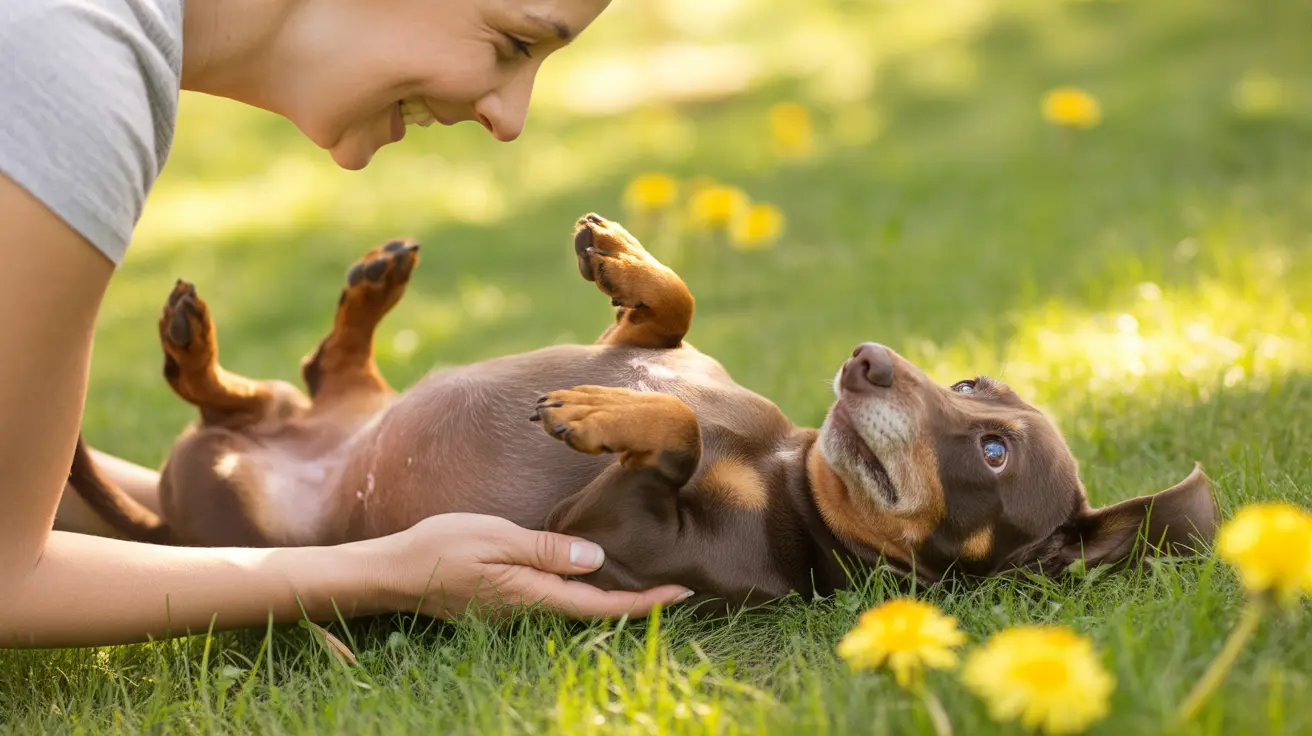If you're a dog owner, you've likely witnessed your furry friend rolling over and exposing their belly, eagerly awaiting a gentle rub. This endearing behavior isn't just cute – it's deeply rooted in canine psychology, physiology, and social bonding. Let's explore the fascinating reasons behind why dogs love belly rubs and what this behavior reveals about our relationship with our four-legged companions.
The Physical Benefits of Belly Rubs
When you give your dog a belly rub, you're activating several physiological responses that create a pleasurable experience. The skin on a dog's belly contains numerous nerve endings and sensitive hair follicles that, when stimulated, trigger the release of feel-good hormones like oxytocin and endorphins. Research shows that just three minutes of gentle petting can significantly decrease stress hormones and increase happiness hormones in both dogs and their human companions.
The belly area's heightened sensitivity also explains the famous "leg kick" reflex many dogs display during a good belly rub. This involuntary response, known as the scratch reflex, occurs when certain nerve endings are stimulated, creating an automatic scratching motion.
Trust and Social Bonding
When a dog exposes their belly, they're displaying a remarkable level of trust. In the wild, the belly is one of a dog's most vulnerable areas, and showing it is a sign of complete submission and confidence in their safety. By willingly exposing this sensitive area to you, your dog is demonstrating their deep trust and comfort in your presence.
This behavior also has roots in pack dynamics. Wild dogs and wolves engage in mutual grooming to strengthen social bonds and maintain pack harmony. When your dog seeks out belly rubs, they're participating in a modern version of this ancient bonding ritual.
Understanding Your Dog's Body Language
Not every belly-up position is an invitation for a belly rub. Dogs may roll onto their backs for various reasons, including submission, fear, or cooling off. It's crucial to read your dog's overall body language to determine if they're genuinely requesting affection or displaying defensive behavior.
- Relaxed facial expressions
- Loose, waggy tail
- Soft, squinty eyes
- Overall relaxed body posture
- Leaning into your touch
The Therapeutic Effects
Beyond the immediate pleasure, belly rubs can have significant therapeutic benefits for dogs. Studies with shelter dogs have shown that regular gentle petting, including belly rubs, can reduce anxiety levels and promote better emotional well-being. This physical contact can help calm nervous dogs and strengthen the human-animal bond.
Individual Preferences and Boundaries
While many dogs love belly rubs, it's important to remember that each dog is unique. Some may prefer other forms of affection, such as ear scratches or back rubs. Always respect your dog's preferences and never force physical contact if they seem uncomfortable or resistant.
Frequently Asked Questions
Why do dogs like belly rubs and what does it mean for their behavior?
Dogs enjoy belly rubs because they stimulate nerve endings that release feel-good hormones. This behavior indicates trust, comfort, and a desire for social bonding with their human companions.
How do I know if my dog is asking for a belly rub versus just exposing their belly?
Look for relaxed body language, playful behavior, and voluntary rolling over. If your dog seems tense or rolls over suddenly when approached, they may be showing submission rather than requesting attention.
What are the best techniques for giving a dog a belly rub to ensure they enjoy it?
Start gentle and watch for positive responses. Use slow, circular motions and pay attention to your dog's reactions. Some dogs prefer light touches while others enjoy firmer pressure.
Can belly rubs help reduce stress and anxiety in dogs, and how effective are they?
Yes, belly rubs can effectively reduce stress and anxiety in dogs through the release of calming hormones. Studies show that regular gentle petting can significantly lower cortisol levels and promote relaxation.
Why do some dogs prefer belly rubs over other forms of affection, like treats or toys?
Some dogs find physical touch more rewarding than food or toys because it satisfies their need for social connection and releases pleasure hormones. This preference often stems from early positive experiences with human touch.
The Power of Touch
The simple act of giving your dog a belly rub is more than just a pleasant interaction – it's a powerful tool for strengthening your bond, promoting emotional well-being, and maintaining your pet's mental health. By understanding and respecting your dog's preferences for physical affection, you can make these moments even more meaningful for both of you.






